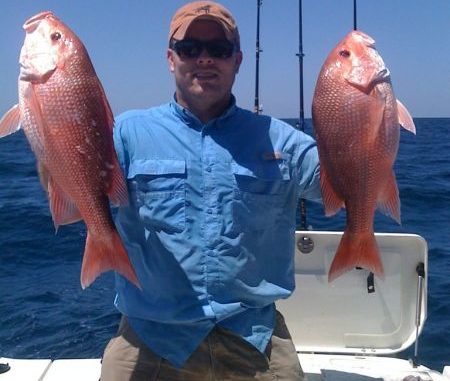
LDWF secretary taken to task for mischaracterizing Florida’s commitment to state red snapper management
The ongoing turmoil at the Louisiana Department of Wildlife and Fisheries continued Thursday in the wake of its opposition to regional management of red snapper in the Gulf of Mexico — but this time another state is involved in the dust-up.
The executive director of Florida’s Fish and Wildlife Conservation Commission sent a pointed letter to U.S. Rep. Rob Bishop to clarify his state’s stance on regional snapper management in response to what he termed an “inaccurate” letter sent to the same congressman earlier this month by LDWF Secretary Charlie Melancon.
The letter from Florida FWCC’s Nick Wiley to Bishop — the chairman of the House of Representatives’ Committee on Natural Resources — made it clear that Florida’s continued support for the Graves bill was contingent upon concerns surrounding the commercial red snapper industry being addressed, but Wiley said Melancon mischaracterized Florida’s stance on potential state management of red snapper.
“Please know that we greatly respect and appreciate our colleagues in the State of Louisiana and all of the other Gulf states, and we hope to work with each of these states to do our part regarding wise and sustainable management of the red snapper fishery,” Wiley wrote. “With that said, Secretary Melancon’s letter includes inaccurate references regarding the Florida Fish and Wildlife Conservation Commission’s position on this important issue ….”
“As a matter of practice, we do not attempt to convey the position of other states regarding these kind of issues. We respect that other states can and should speak for themselves in a manner that accurately conveys their positions and concerns. We hope that other states would reciprocate this same level of respect and cooperation.”
On Page 2 of Melancon’s letter to Bishop, which was written on State of Louisiana letterhead and dated Sept. 15, he points out that some organizations — including the Louisiana Restaurant Association, the Destin Charter Boat Association, the Florida Restaurant and Lodging Association and the Gulf of Mexico Reef Fish Alliance — had expressed concern to the Florida Commission about U.S. Rep. Garret Graves’ legislation that would strip Gulf red snapper from the authority of the federal government and award it to the five-state coalition.
“These concerns were strongly considered by the Florida Fish and Wildlife Commission (FWC), and the FWC instructed Executive Director Nick Wiley to withdraw support for HR 3094 unless Mr. Graves removed references to the commercial and charter-for-fire sectors,” Melancon wrote. “Additionally, it was announced via social media by FWC on Sept. 9, 2016, that the estimate to Florida to manage red snapper under HR 3094 would be approximately $40 million.”
Melancon said earlier this summer that Bishop’s amendment to H.R. 3094 stripping federal funding from the legislation was a “poison pill” designed to kill the legislation in Washington, D.C., despite assurances from Bishop’s office that the federal government would still pay for stock assessments of red snapper in the Gulf of Mexico if H.R. 3094 becomes law.
Wiley did not return a phone call requesting comment Friday, but FWC public information specialist Amanda Nalley said in an email that her office never put out an estimate on Florida’s costs to manage red snapper via social media.
“The $40 million number did not come from us …,” Nalley said. “We do not have any further comment on this issue.”
In a phone interview Friday afternoon, when asked to explain where he got the $40 million figure from, Melancon said he stood by his letter of Sept. 15.
“If you read my letter, you see where it came from,” Melancon said. “But let me just suggest or say that if that number is wrong, I apologize to Florida for that.
“However, I would suggest that you ask Mr. Wiley and the Florida people, ‘What is that number?’ Because the number has been talked about.”
When pressed on where he got the $40 million estimate in his letter, Melancon said the main emphasis of his letter was that Louisiana and now Florida both have concerns with H.R. 3094.
“Let me just suggest that when I tried to get a (red snapper management cost) number for Louisiana and went about it as scientifically and as best we could, we put a number out and people called it a lie,” he said. “Where I am right now is Florida and Louisiana agree that Garret Graves’ bill in its present form is not an acceptable piece of legislation.
“The numbers that you want from Florida — again I apologize if my numbers are wrong. I got them from people in Florida, I got them from an article in Florida, I got them from social media in Florida. If they’re not official, then I apologize. But Florida can give you the number.”
In her email, Nalley said Melancon’s $40 million number might have come from a Sept. 7 article published by the Environmental Defense Fund, which estimated five-year snapper management costs for each Gulf state using Louisiana’s cost estimate as a starting point.
But Louisiana’s cost estimate — which includes $10 million-plus for the first year alone — has come into serious question after Bishop contended the feds will still pay for data collection.
In a letter dated Sept. 23 addressed to Graves, Wiley did say Florida’s FWCC had concerns about some facets of H.R. 3094.
“After a robust discussion, the Commissioners asked me to advise you that FWC continues to support the concepts embodied in the bill and the five Gulf states’ plan, but our continued support is conditioned upon changes that would address the concerns in the commercial sector or otherwise would exclude the commercial sector from management under the GSRSMA,” Wiley wrote. “We believe this can be a successful path forward, and we expect the stakeholders in the commercial sector to actively and constructively engage you in helping improve the legislation as you have offered to consider their input.
“The Commission respects the concerns of the commercial sector, but also shares your concern that status quo management at the (Gulf) Council is not working for recreational anglers.”
Graves did not reply to an interview request for this article.
The LDWF under Melancon has been a vocal critic of H.R. 3094 — a sharp turnaround from the previous administration of Robert Barham, which wholeheartedly supported state management of red snapper, and actually helped create the Gulf States Regional Management Authority that would administer the program under the proposed legislation.
Also on Friday, Melancon confirmed that his department received a letter this week from the National Oceanic and Atmospheric Administration seeking clarification on the amount of red snapper data the agency would share with the state if Graves’ legislation ultimately becomes law. If the federal government still will provide stock assessment information, that would drastically reduce the cost of managing the program for the five Gulf states.
But Melancon’s not making the contents of the NOAA letter public until next Thursday’s meeting of the Louisiana Wildlife and Fisheries Commission in Baton Rouge.
“I’m waiting for the Commission,” Melancon said. “People say I’m giving out too much information on the front, and some people say I’m not giving out enough.
“So I’m going to give it to the Commission.”


